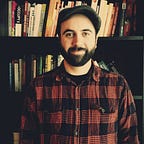Alberta Education and Curriculum Crisis
I had the opportunity today to be invited to speak at a rally protesting the United Conservative Party’s plans for education and our curriculum. I know that many teachers from across Alberta were not able to attend so I wanted to share what I said here. Check it out!
It’s a beautiful day here on Papaschase Cree Land in Treaty 6 territory. And it’s great to see so many folks come out to support public education.
My name is Dan Scratch and I’m a social studies teacher here in Edmonton. I want to thank the organizers for setting up this event and inviting me to share a few words about the state of curriculum and public education in Alberta.
But before I do that. I want to frame the way in which myself and many others view education. I see what we do in classrooms and schools from the point of view of those in the margins of our society. You see, when I started teaching I wanted to use the immense privilege I had as an educator to stand in solidarity with all of those students who could not find themselves in schools. All of those students who were pushed out and fell through the cracks or their brilliance wasn’t recognized in a classroom. I’m a white, straight, middle-class dude who definitely struggled in my high school education but I did not face systemic oppression in the way that many of my students have had to both in and out of schools. Issues of racism, homophobia and transphobia, ableism, classism, and colonialism all perpetuate the lives of young people and especially those who struggle to find their ways in our classrooms and schools.
And I bring this up because these are the students who will be most drastically and negatively impacted by the proposed changes to education that are found in the UCP education plan. We know that students in the margins will feel the cuts to education the hardest as breakfast programs and other wraparound services can’t find the money to continue. We know that students will struggle to find a sense of belonging and make meaningful relationships with their teachers in class sizes of 35–40+ students. We know a properly funded education system strengthens a more just and equitable society and yet the slippery slope to privatization is the road that this government wants to go down.
So, my friends, we are charged with the duty to defend public education in Alberta but to also challenge ourselves to grow a more just and equitable public education system that serves the needs of all young people. When I was a new teacher I was told by a veteran teacher that the day I signed up to do this job is the day I signed up to be an advocate for my students. I’ve tried to follow this advice to the best of my abilities throughout my career and I’m so encouraged by not only those of you in attendance today but by all those who across Alberta who are willing to stand up and speak out for the young people we teach. I know the teachers here today would rather be getting set up in their classrooms for the first day of school but we are called here today to make our voices heard as our students deserve a quality education that includes new evidenced-based quality curriculum.
I do not have any hope that the folks on the new UCP Curriculum Review Panel will make the recommendations needed to ensure that teachers and students will have a curriculum that they so desperately need. On the curriculum review panel, there is not one active teacher or student there to provide expertise and advise. So, I thought if they were going to ask a teacher like me for advice on the social studies curriculum, this is what I’d tell them:
We live in a time of climate crisis, rising white nationalism and uncertainty about the future. In order to take on and make sense of these challenges, it requires students are taught how to think freely and critically, to build empathy and understand that they are part of this world and have the power to make it a better place. Teachers need the curricular tools to help students to make sense of the most pressing issues our world faces as well as providing the opportunity for all students to see themselves in their learning.
Education is not nearly the memorization of content to regurgitate on a standardized test, it is about helping young people become the best versions of themselves that they can be so they can realize their potential as well as understanding our collective strength that we can make the world a more just and equitable place. Not only does curriculum need to teach content but also values of justice, fairness, equity and active citizenship, as well as the need to tell the stories of Indigenous peoples, of the queer community, of poor and working people and all those times where people have acted magnificently in the face of injustice in order to demand that they are treated with dignity, respect and rights.
We should not be afraid to declare that education is about more than just filling the needs of the economy. Education is political and teaching is a political act. Let’s not be afraid to declare what we believe in as teachers and let’s never back down from advocating for our students.
We know that this will not be the last attack on public education or on us as teachers. But together, collectively we can both defend and push our education system to provide all students with an experience that empowers them to reach their full potential and make the world a better place.
Thanks, everyone!
